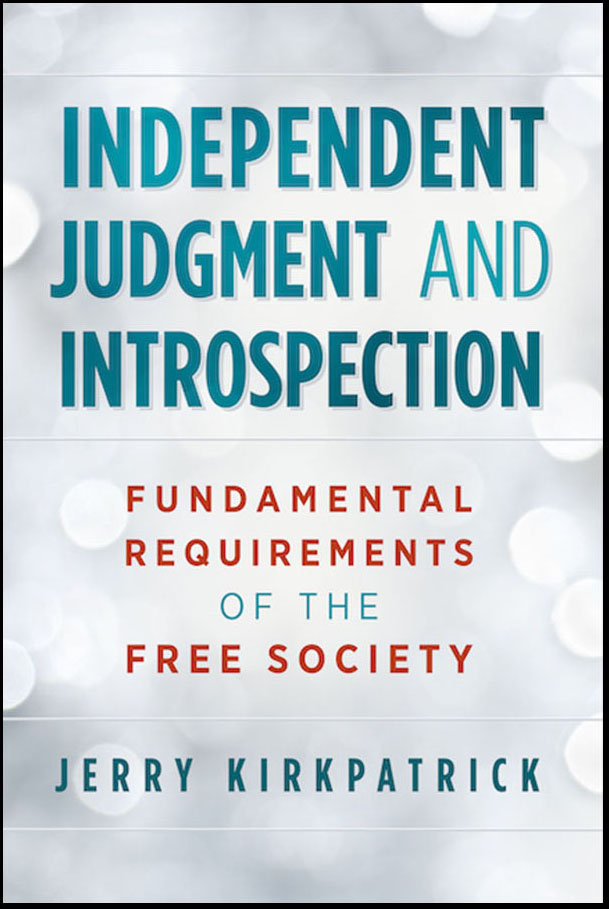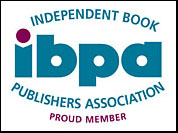Scholarly works in the Objectivist and Austrian Traditions
Reviews • Preface • Excerpt • Behind the Scenes
by Jerry Kirkpatrick, Ph.D., Professor emeritus of International Business and Marketing, California State Polytechnic University, Pomona (Cal Poly Pomona)
Hardcover $34.95, Softcover $16.95, Ebook $6.99
Buy: Amazon, Barnes & Noble, IndieBound
Ebook: Kindle, Apple Books, B&N Nook, Kobo, or Smashwords
Libraries: Ingram or Baker & Taylor

The boy in the Hans Christian Andersen tale of “The Emperor’s New Clothes” is often admired for his independent judgment, that is, for his courage to speak a truth that the adults feared to acknowledge openly. Two questions, however, can be asked about independent judgment as a character and personality trait. One, can everyone really practice it (besides naïve children) or is it the province of true creators and innovators, such as Socrates and Galileo? And, perhaps giving rise to doubts expressed in the first question, a second asks, how does one handle the hazards of independent judgment, such as the prospect of offending other people, sometimes resulting in death (Socrates) or house arrest (Galileo)?
Independent judgment is correct perception of the facts of reality and courage to acknowledge and assert those facts. The two questions above arise because of complicating factors; intelligence and interest can affect one’s initial perception of facts and other people can affect both the initial perception and assertion of the judgment. Psychology plays a dominant role throughout.
Great innovators, especially those who challenge centuries of convention, are highly intelligent. They also are extremely interested and motivated in their areas of innovation. Those of us who do not possess the same intelligence or interest, whether college professor or blue-collar worker, can nevertheless use our intelligence in areas of interest to perceive and assert what we do see. Intelligence combined with interest determines who is likely to see ahead of others, and those of us who do not see initially can learn from those who do, but intelligence is not a prerogative of the highly educated. Independent judgment can be practiced equally by a garage door repairman as by a scientist.
So why don’t more people practice independent judgment? Which is to ask, why don’t they join the boy in the tale of “The Emperor’s New Clothes”? The answer is fear, real or imagined, of what might happen to them. The real fear of death or incarceration that can result from speaking one’s mind poses a needless moral quandary. We have no moral obligation to drink hemlock, as Socrates did, to preserve our independent judgment. Many in the Soviet Union managed to maintain theirs by expressing it to family and trusted friends, sometimes speaking in a foreign language to prevent nosy neighbors from overhearing their conversations and reporting them. They were conventional on the outside, in public, to preserve their lives, but independent on the inside, at home, to preserve their self-esteem.
Most of us do not face the real fears of a Socrates, Galileo, or citizen of the Soviet Union. Our fears of expressing independent judgment stem from what others might think of us. Disapproval, maybe rejection, is the worst that might happen, yet the anxiety caused by self-doubt can be so strong as to blur our perception of the facts, thus preventing any expression of an independent judgment. When choices based on self-doubt build up over time, habits of perceiving reality through clouded lenses become established patterns of behavior. Seeing the world through the eyes of others, whomever those significant others may be, becomes the norm. Conventionality is the result.
Can independent judgment be taught? Yes, but it must start at an early age. Children, of course, need to be given love and support, but they also need to be given freedom, within limits appropriate to their maturity, to choose their own values. And they need to be allowed to learn from their mistakes. Most parents are loving toward infants, but when the children move into their “terrible twos,” parents begin controlling and in some cases hitting. Often, the controlling continues throughout childhood and becomes a constant in traditional schools. Choice and self-assertion are seen as a disruption of authority and disobedience. In reality, they are signs of developing self-esteem and personal identity. When they are erased by the controlling, authoritarian behavior of adults, children quickly get the message that getting along means going along. It is a rare child who matures to adulthood with independent judgment intact. Perhaps this is why we tend to think that only certain people can fully achieve it.
Independent judgment is a fundamental requirement of the free society. Unless each adult citizen possesses a significant amount of self-esteem expressed as independent judgment, such a society cannot last.
The aim of this book is to explore the nature of independent judgment and its relationship to the free society. Throughout the journey, we will find that psychology, especially the skill of introspection, plays a significant role in developing and maintaining independence in the individual and in generating the desire to live in a free society.
The book begins by chronicling the historical war on independence, that is, how the character and personality trait has been ruthlessly destroyed in children from the earliest times of civilization and how it is routinely prevented from developing today. It next examines the nature of psychology as a science, psychology’s epistemological foundations and its relation to political individualism and moral egoism. The book further analyzes how independent judgment develops in the individual, probing the depths of psychology to demonstrate how seemingly uncontrollable subconscious premises guide our lives and how we can identify and change those premises through introspection.
Several mistaken conceptions of independence are discussed, including the Socrates question, “do we have to die for our independence?” along with a clarification of the meanings of autonomy and responsibility, the relation of independence to intelligence and epistemological certainty, and a comment on three well-known deference to authority studies from the mid-twentieth century. Finally, the book elaborates the meaning of introspection and the defensive habits we must identify and correct through introspective skill, and it then recommends to parents and teachers methods of teaching that skill to their children and students. The overall aim of “educating for independence,” as the last chapter is titled, is to correct, and preferably prevent, thinking errors that lead to psychological problems.
It is those psychological problems that prevent the development of independence and happiness and, in turn, the uncompromising desire to live in a totally free society. Independent judgment and introspection in each individual are the fundamental requirements of expanding personal and political freedom.



